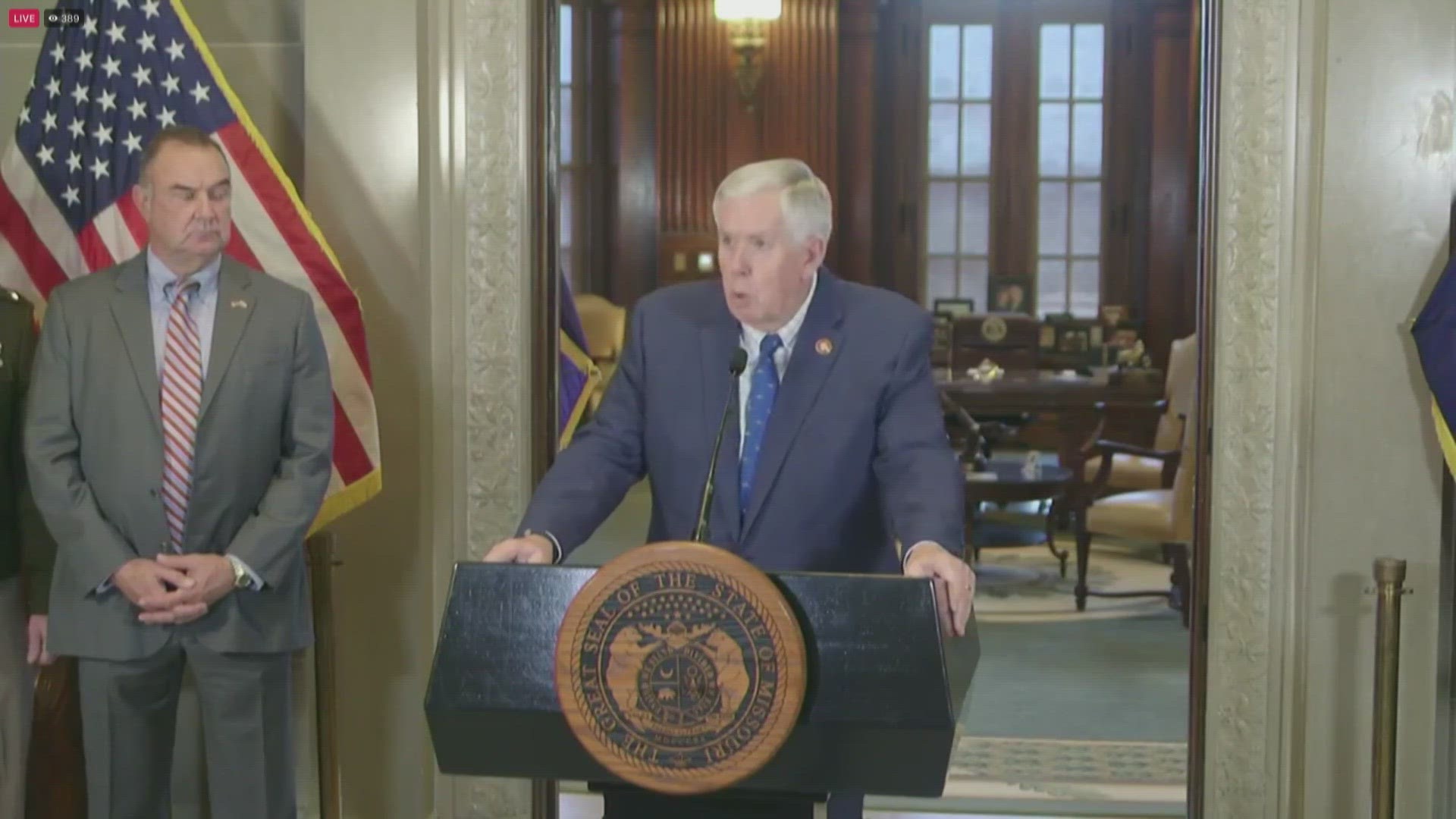JEFFERSON CITY, Mo. — Companies from China, Russia and other countries blacklisted by the U.S. no longer can buy land near military sites in Missouri under an order enacted by the state's governor Tuesday.
Republican Gov. Mike Parson's executive order prohibits citizens and companies from countries deemed threatening by the federal government from purchasing farms or other land within 10 miles of staffed military sites in the state. The federal government lists China, Cuba, Iran, North Korea, Russia and Venezuelan President Nicolas Maduro as foreign adversaries.
Parson's move comes after a Chinese spy balloon's flight across the U.S. lent momentum to decades-long national security concerns about foreign land ownership.
Ownership restriction supporters often speculate about foreign buyers’ motives and whether people with ties to adversaries such as China intend to use land for spying or exerting control over the U.S. food supply.
Parson, a cattle rancher, on Tuesday told reporters that he believes his action goes as far as legally allowable for executive orders. He said he’ll be watching to see what legislation, if any, state lawmakers can pass on the issue by the mid-May end of session.
Republican Senate President Caleb Rowden has said passing such a law is a top priority for the session that begins Wednesday.
“While we have had no issues at this point, we want to be proactive against any potential threats,” Parson said.
Parson added that foreign entities currently do not own any land within 10 miles of military sites in the state.
Foreign entities and individuals control less than 2% of all U.S. land, and Chinese companies control less than 1% of that, according to the latest available report from the U.S. Department of Agriculture, which includes 2022 data. Canadian investors own the largest percentage of foreign-held land.
In Missouri, foreign landowners account for an even smaller fraction of farmland. More than 99.5% of the state's agricultural real estate rests in American holdings. Chinese-linked firms hold 0.15% of Missouri farmland after the most recent reported transaction hit the books in 2018.
Professor Nancy Qian, an economic expert who studies global poverty and historic famines that sprang up in Communist countries like the Soviet Union and China, argued that the U.S. government already has the tools it needs to adequately protect military sites and guard the domestic food supply from scarcity.
"There are already regulatory infrastructures in place for this, and it's sensible to add existing requirements that are strategically important for locations that are being sold," Qian said. "What doesn't make sense is an all-out ban of any group for owning farmland or any type of land. These carte blanche policies don't help Americans for several reasons."
"If we think about just farmland in general going to foreigners from any country, it can really only help Americans economically because the money that they're paying for the land goes to Americans," Qian said.
She said the food supply itself can be regulated by the federal government at shipping ports, and she cautioned against total broad bans that might impact a seller's ability to attract the highest bidder for the land.
"Chinese cannot buy farmland in China. In China, all land is owned by the state," she said. "If other countries do things that are counterproductive for the economic welfare of their citizens, let's not copy them."
Missouri was among several Midwest states to pass laws in the 1970s that prohibited or restricted foreign land ownership amid concerns over Japanese investment.
"I would call it a comparison to the Yellow Peril," Qian said. "In the eighties, many of us have forgotten Japan was a big economic adversary. Not a political adversary the way China is, but an economic adversary.
"There was a huge amount of fear of the Japanese buying up big swathes of California and important iconic American sites like the Rockefeller Center," she said. "But Mitsubishi bought the Rockefeller Center for $1.3 billion. It was all over the news. You know, 'Japan is taking over America. The second Yellow Peril.' It went on and on. And in the end, it was Americans who benefited. Mitsubishi overextended. They defaulted on their loans and it was sold back to Americans for a bargain. So to me, this is very similar to that."
Missouri law completely banned foreign land ownership until 2013, when lawmakers passed a bill allowing as much as 1% of agricultural land to be sold to foreign entities.
Parson, along with every other state senator present for the vote, voted in favor of the bill, which also included changes to Missouri’s animal abuse and neglect law and a longer maximum prison sentence for stealing livestock.
"The threats are different today than what they were then," Parson said. "We know we live in a different era right now with security, with all the things are going on."
Chinese entities owned 42,596 acres (172 square kilometers) of Missouri agricultural land as of 2021 — just a little under half of the roughly 100,000 agricultural acres (404 square kilometers) owned by all foreign entities, according to the Missouri Department of Agriculture. Much of that land is used for corporate hog farms in northern Missouri and is owned by a Chinese conglomerate that purchased Smithfield Foods Inc. in 2013.
Limitations on foreign individuals or entities owning farmland vary widely throughout the U.S. At least 24 states have restrictions.

